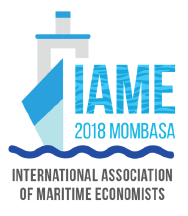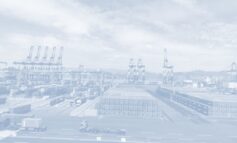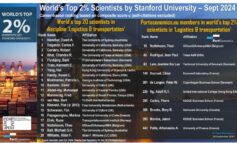26th annual conference of the International Association of Maritime Economists (IAME), Mombasa, Kenya, September 18th – 21st, 2018
Sustainable maritime, port and logistics industries in emerging economies: towards a path of Blue Growth
The maritime economy is increasingly being rebranded or retooled towards the “Blue Economy” or “Blue Growth”. Many regions and countries, both from the industrialized and emerging economies, have identified the “Blue Economy” as a future driver of sustainable growth across traditional sectors such as food (e.g. aquaculture), energy (e.g. offshore wind, wave energy) and tourism & leisure. The “Blue Economy” or “Blue Growth” obviously also and even foremost concerns the area of maritime shipping, trade and industry, to be considered a more ‘traditional’ area of research in the broader field of Maritime Economics. However, moving towards a Blue Economy from a maritime economy puts forward a number of research challenges in terms of (1) the development of integrated strategies and the related multi-disciplinarity (2) co-habitation and resource use in the maritime space (3) the definitions of ‘maritime economics’ and ‘blue economics’ and (4) different applications of concepts such as, among others: hinterlands, forelands, stakeholders and impacts.
With the organization of the IAME 2018 conference in Mombasa (Kenya), the Maritime Economists community, starting its 2nd quarter century, not only opens up for the African continent as a major vector of the future development of its subdiscipline within the broader field of transportation and logistics, but also towards the other areas of application that can now be considered and integral part of the maritime (or blue) economy. In sum, the IAME 2018 conference intends to provide intellectual enriching interfaces on various levels:
- Between scholars from developed and emerging economies;
- Between scholars from multiple disciplines gathering around the concept of “Sustainable Blue Growth”
- Between scholars, practitioners and policy makers in the field of “Blue Growth”.
Therefore, the conference welcomes contributions under the form of full papers, extended abstracts, and panel symposia, providing answers on, inter alia, the following questions:
- The development of ports, shipping and logistics markets on the African continent, including both freight and cruise related markets;
- Exploring the concept of the “Blue Economy” and “Blue Growth”: definitions, scope, impacts;
- Is there a difference between the “Blue and Maritime Economy”?
- Learning effects and knowledge spill-over from developed economies to developing economies (and vice versa), and between developing economies, in the context of “Blue Growth”;
- Maritime skills and education development in emerging economies, including the challenge of automation and technological developments in ports within environments of surplus labour and political pressures for job creation;
- How do the local African conditions in particular, and emerging economy characteristics in general, influence our existing conceptual frameworks within ports, shipping and maritime logistics research
- Big data, new ICT developments, and other technological advances in ports: how and under which conditions can both developed and emerging economies use it to their social, economic and environmental advantage?
- Relevance, impacts and policy in the context of automation in the ports, shipping and logistics industry;
- Development of the cruise market in emerging economies;
- Responses to sustainability challenges in emerging economies for shipping, ports and logistics;
- Hinterland strategy development – towards landlocked countries – the role of port authorities and other supply chain stakeholders;
- Development and management of rail networks in developed countries and the challenges to make those contribute to port development;
- Operational management challenges for shipping, ports and logistics in emerging economies;
- The social role of ports in emerging economies;
- Port-city relations in emerging economies;
- Maritime and port security (piracy) in shipping and ports;
- Impact and role of the One Belt – One Road (OBOR) policy of the Chinese government on ports and maritime chain stakeholders;
- Ethics of trade and the role of port authorities / port stakeholders in supply chain ethical responsibility;
- Successful governance and reform of the port and maritime economy, with specific attention to the impacts of private sector participation in the maritime industry;
- The role and impact of trade associations in the maritime economy.
Contributions that provide learnings from developed to emerging economies, but also vice-versa, are appreciated. Next to the overarching conference theme, contributions within the traditional subtopics of maritime economics, as identified for the previous IAME conferences, are most certainly welcomed.
Key dates (See also the website for more detailed information, iame2018.com)
| Full review track | |
| November 30th, 2017 | Abstract Submission |
| February 28th, 2018 | Full paper submission |
| Extended abstracts | |
| February 28th, 2018 | Extended abstracts submissions |
| NEW: Panel Symposia proposals* | |
| February 28th, 2018 | Panel Symposium submission |
* Panel symposia are single-blind reviewed. The reviewers see the names of the presenters, participants, and organizers. Proposals for panel symposia are judged based on overall quality, interest to IAME members, relevance to the conference theme, innovation, and contribution. The aim of panel symposia is to develop new innovative research ideas around specific subthemes.
A panel symposium submission must include the following and be organized in the following order:
- Title of symposium
- Complete formal names and affiliations of all participants
- Proposed format of the panel symposium. Symposia should be designed to fit a 90-minute session.
- A 3-6 page overview of the symposium that includes:
– Short synopsis of panellist interventions (max. 1 page per panellist)– Outline of how the panel discussion will be organized– NOTE: no formal paper presentations are allowed!
Download the IAME2018 call for papers and presentation












